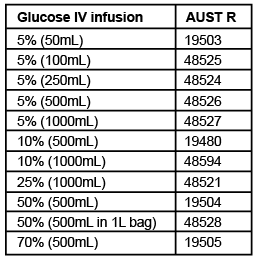Consumer Medicine Information
What is in this leaflet?
This leaflet answers some common questions about Glucose 5%, 10%, 25%, 50%, and 70% Intravenous Infusion [‘Glucose IV Infusion’]. It does not contain all of the available information. It does not take the place of talking to your doctor or pharmacist.
All medicines have risks and benefits. Your doctor has weighed the risks of you being given Glucose IV Infusion against the benefits they expect it will have for you.
If you have any concerns about this medicine, ask your doctor or pharmacist.
Keep this leaflet. You may need to read it again.
What Glucose IV Infusion is used for
Glucose IV Infusion (5%) is used for whenever non-electrolyte fluid replacement is required. It may also be used to reconstitute and delivering other drug products.
Glucose IV Infusion (≥10%) is indicated as a source for energy support, which can be used alone or in combination with an injectable nutrient supplement. For example, in patients where:
- the gastrointestinal tract cannot be used (such as, when bowel rest is needed after gastrointestinal surgery);
- the gastrointestinal absorption of protein is impaired; or
- metabolic requirements for protein are substantially increased (such as in the case of extensive burns to the body).
Before you are given Glucose IV Infusion
Glucose IV Infusion (≥5%) should not be given to you if:
- you have an allergy to corn or corn products, or any ingredient listed at the end of this leaflet. Some of the symptoms of an allergic reaction may include skin rash, itching or hives, shortness of breath, wheezing or difficulty breathing, swelling of the face, lips, tongue or other parts of the body;
- you already have too much glucose in your blood;
- you have had an ischaemic stroke or head trauma within 24 hours
Glucose IV Infusion (≥10%) should also not be given if:
- you are severely dehydrated, or not passing urine;
- you are suffering from bleeding in the brain or spinal cord.
Glucose IV Infusion should not be used:
- if the solution is not clear;
- if the packaging is torn or shows sign of tampering;
- after the expiry date printed on the pack;
- through the same tubing as those containing blood.
Tell your doctor if:
- you have any allergies to any medicines, foods, preservatives or dyes;
- you have head injury, stroke, heart disease, renal impairment, fluid/electrolyte imbalance, infection, impaired glucose tolerance or diabetes, vitamin B1 (thiamine) deficiency or chronic alcoholism, and any other illness;
- you are pregnant or intend to become pregnant or breast feeding;
- you are taking any medications for diabetes, corticosteroids, corticotropin; or other medicines, including those that you buy without a prescription from your pharmacy, supermarket or health food shop.
How Glucose IV Infusion is given
How much is given
Your doctor will decide on the dose of Glucose IV infusion that will be given to you, which depends on your age, weight and medical condition.
How is it given
Glucose IV infusion will be given as an infusion (ie slow injection) into the vein by your doctor or specially trained nurse.
If you are given too much (overdose)
The doctor or nurse administering Glucose IV infusion has had experience in the use of this sort of medicine, so it is unlikely that you will receive too much.
If you are given Glucose IV Infusion too quickly or too much, you may become confused and/or dehydrated. Other symptoms may include some of the side effects listed under ‘Side effects’.
If you experience any side effects that worry you after receiving Glucose IV Infusion, tell your doctor or nurse.
While you are being given Glucose IV Infusion
Discuss with your doctor the progress you have experienced during or after treatment, including any unexpected effects, especially during the first few days of therapy. Frequent checks by your nurse and doctor, including laboratory tests, may be required.
Side effects
Tell your doctor, nurse or pharmacist as soon as possible if you do not feel well while you are being given Glucose IV infusion.
All medicines can have some side effects. Sometimes they are serious, most of the time they are not. You may need medical treatment if you get some of the side effects.
Do not be alarmed by the following list of side effects. You may not experience any of them.
Ask your doctor or pharmacist to answer any questions you may have.
Tell your doctor, nurse or pharmacist if you notice any of the following:
- local pain, inflammation or redness at the site of injection
- flushing (all over the body)
- fever or chills
- passing large amounts of urine, excessive thirst, and having a dry mouth and skin.
Tell your doctor, nurse or pharmacist immediately if you notice any of the following:
- rash, itching or hives on the skin,
- swelling of the face, lips, tongue or other parts of the body,
- shortness of breath, wheezing or trouble breathing.
These may be symptoms of an allergic reaction and urgent medical attention may be required.
Tell your doctor, nurse or pharmacist if you notice anything that is making you feel unwell. Other side effects not listed above may occur in some people.
Product description
What Glucose IV Infusion looks like
Glucose IV Infusion is a clear colourless or slightly yellow solution of glucose in the VIAFLEX bag.
Ingredients
Glucose IV Infusion contains glucose and Water for Injections.
Products
Glucose IV infusion is available in the following concentrations/volumes:

Storage
Glucose IV infusion will be stored in the pharmacy or in the hospital ward. It is recommended that Glucose IV infusion is stored below 30°C.
Sponsor
Baxter Healthcare Pty Limited
1 Baxter Drive
Old Toongabbie NSW 2146
Date of preparation: May 2014
BAXTER and VIAFLEX are registered trademarks of Baxter International Inc.
Published by MIMS October 2017
